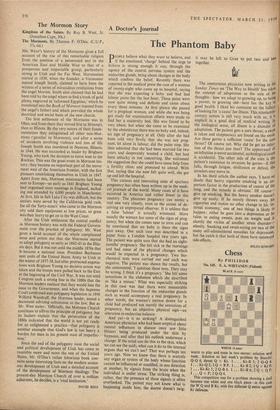A Doctor's Journal
The Phantom Baby
PEOPLE believe what they want to believe, and if the emotional 'charge' behind the urge to believe is strong enough it can, through the agency of the central nervous system and the endocrine glands, bring about changes in the body which confirm the belief. Recently there was reported in the medical press the case of a woman of twenty-eight who came up to hospital, saying that she was expecting a baby and had had labour pains for the last hour. These pains were now quite strong and definite and came about every three minutes. At first glance she passed for a pregnapt woman, and while she was being got ready for examination efforts were made to find her a maternity bed. She was found to be very obese, but when she came to be examined by the obstetrician there was no baby and, indeed, no sign of pregnancy at all. Only after she had been told very firmly that she was not preg- nant, let alone in labour, did the pains stop. She then admitted that she had been married for two years and desperately wanted a child, but had been unlucky in not conceiving. She welcomed the suggestion that she could have some help from a fertility clinic and promised to attend. With that, saying that she now felt quite well, she got up and left the hospital.
This curious and interesting state of spurious pregnancy has often been written up in the medi- cal journals of the world. Many cases of it have occurred in America and rather fewer in this country. The phantom pregnancy can mimic a real one very closely, even to the extent of de- ceiving an unprepared observer. It is seldom that a false 'labour' is actually witnessed. More usually the woman has some of the signs of preg- nancy, but when she comes near to term and can be convinced that no baby is there -the signs pass away. One such case was described in a paper from a London hospital two years ago. The patient was quite sure that she had an eight- months' pregnancy. She felt sick in the mornings and had some of the physical changes which would be expected in a pregnancy. Two bio- chemical tests were carried out and each was negative. The patient was shown the results, but she commented, 'I question these tests. They may be wrong. I think it's a pregnancy.' She felt some sensations in the abdomen which she described as 'like a mouse.' What was especially striking in this case was that there were measurable changes in the function of the endocrine glands such ap would accompany a real pregnancy. In other words, the woman's intense desire for a child had produced not merely the sensations of pregnancy, but an objective physical sign—an alteration in endocrine balance.
And yet—is it so striking? A distinguished American physician who had been sceptical about mental influences in disease once saw little blisters being produced under the skin by hypnosis, and after that his outlook underwent a change. If the mind can do this to the skin, which we can see (he said), what can it do to the internal organs that we can't see? That was perhaps ten years ago. Now we know that there is scarcely any organ or system of the body whose function cannot be influenced or modified, in one direction or another, by signals from the brain when the individual is under stress. The striking thing is, rather, that the presence of these signals is often overlooked. The patient may not know what is happening inside him; the doctor doesn't twig; it may be left to Gran to put two and tvi° together.
The anonymous physician now writing in the Sunday Times on 'The Way to Health' has taken the concept of adaptation as the axis of his thoughts : how we adapt to growing up, to being a parent, to growing old—here lies the key t° good health. I liked his comment on the fallacY of looking for 'a cause' for illness. This nineteenth' century notion is still very much with us; it is implicit in a good deal of medical writing. in, the biological sense, all illness is a disorder 01 adaptation. The patient gets a sore throat; a swab is taken and streptococci are found on the swab. Are these germs a sufficient 'cause' for the sore throat? Of course not. Why did he get an infer' tion of the throat just then? The appearance of an infection is never accidental; no biological event is accidental. The other side of the coin is the patient's resistance to invasion by germs—if this falls, through fatigue, disillusion or defeat, the invaders may move in.
In his third article the author says, 'I have 00 doubt that heavy cigarette smoking is an in? portant factor in the production of cancer of the lung, and the remedy is obvious.' Of course' give up smoking. But the heavy smoker doesn't give up easily. If he merely throws away his cigarettes and makes no other change in his 'ill' ternal economy,' one of two things is likely t° happen : either he goes into a depression or he takes to eating sweets, puts on weight and 0 shortly the victim of another stress disorder-- obesity. Smoking and sweet-eating are two of the many self-administered remedies for depression, but the catch is that both of them have untoward side-effects.


































 Previous page
Previous page